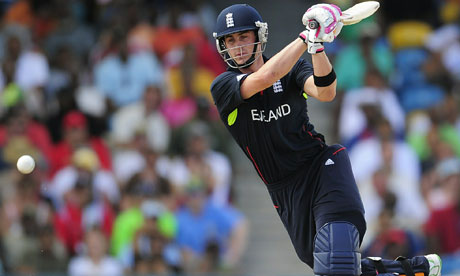England's World Twenty20 success is built on the appliance of science
Andy Flower and Paul Collingwood have found the formula for long-term success in the shortest form of the game

Craig Kieswetter has excelled at the top of the order for England. Photograph: Emmanuel Dunand/AFP/Getty Images
Having beaten Sri Lanka so convincingly in their semi-final yesterday, (and, one hopes, having had a really good and well-earned night out at the Lime bar in Rodney Bay) England flew from St Lucia thismorning uncertain if they would meet Australia, the favourites, or Pakistan, the holders, in the final. Such is the momentum this side has gained in the past fortnight, they would not much care either way. They are a team comfortable with the idea that if they play as well – as consistently – as they have been playing, then they are as good as anyone in this tournament.
England's transformation from no-hopers, lagging behind the rest of the world, to contenders is not just a function of the transient nature of Twenty20, where anyone can win on the day. Increasingly, as sides have started to take the format seriously and give it as much thought as they do the other forms of the game, that idea has become defunct. If some teams still blow hot and cold, as Pakistan have done, then England and Australia have had the good sense to strip Twenty20 down to the bones and rebuild it. Their success, in which teams have been beaten with clinical precision, is no fluke.
For England, the transformation began with the idea that even this shortest form of the game, rather than involve one hell-for-leather sprint to the line, has three distinct phases. First come the six overs of the powerplay, when the field is up and the acres are there, via the aerial route and through the infield, for batsmen with fast hands and a good eye. Next there is consolidation, eight to 10 overs perhaps, as the containing bowlers emerge, often, although not always, offering spin, with pace taken from the ball and the field out. Finally comes the sprint for the line, a third or more of the runs often coming in the final three overs.
So England searched for a pair of openers who could hit the ball cleanly, fearlessly and a long way. Astute selection from Geoff Miller, the national selector, has given them Craig Kieswetter and Michael Lumb. Neither has made a half-century, but it is not chance that has given England the top two power-play scores of the tournament.
Watching Kieswetter and Lumb against Sri Lanka in St Lucia, it was hard to credit that three decades ago England opened the batting in a World Cup final with Mike Brearley and Geoff Boycott; or that even three years since, here in Bridgetown, when they were humiliated by South Africa (the team they humiliated last week) the first three were Michael Vaughan, Ian Bell and Andrew Strauss. It remains to be seen whether the new order will translate itself into the 50-over format –but Strauss may find himself confined to Test duty.
Against Sri Lanka, even after the bowlers had done such a professional job, there was still a danger that a side adept in strangling the opposition on slow and grabby pitches might make the chase a cumbersome affair. Inside eight overs, Kieswetter and Lumb had consigned that idea to the bin, their opening partnership proving so confident and incendiary that it left a relative stroll for Kevin Pietersen. He, nonetheless, batted with such massive authority that he has now scored 95 from 59 balls either side of the birth of young Dylan.
In effect, the way is left clear for those "down the order" – which, not the pejorative term it once was, is a badge of honour now, meaning you are an elite hitter – to clear the front leg out of the way and belt the living daylights out of it. Twenty20 batting orders can thus go a regular batsman light. Thus while Australia are fortunate to have a troubleshooter such as Mike Hussey at six or seven, England are still comfortable with Luke Wright at six, knowing that unless things go badly wrong he will have only five overs or so to bat, with competent players further down the order. For 50-over cricket, that may be a place or two too high.
That England have progressed this far in such a short space of time reflects great credit on the team director, Andy Flower, and Paul Collingwood, whose input, as England's most experienced one-day player, will have been significant. Collingwood has been authoritative and in control but we should not forget that he gave up the captaincy once before, because it affected his game. His figures in this tournament –49 runs from six innings and a strike rate of 90 – might suggest that problem has not gone away. Success or otherwise, he might need a good final to dispel that notion.
- guardian.co.uk © Guardian News and Media Limited 2010

No comments:
Post a Comment